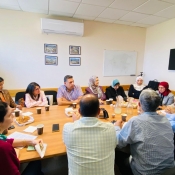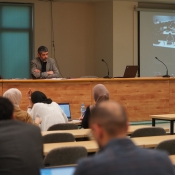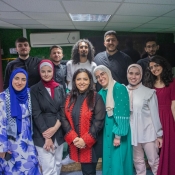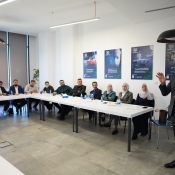Forum Focuses on Life of Abu Omar, Shining Light on Revolutionary Palestinian Intellectuals
Palestinian politicians, activists and academics commemorated on November 22, 2016 the 40th anniversary of the disappearance of Palestinian revolutionary Hanna Mikhail, also known as “Abu Omar,” also highlighting the role of intellectuals in the Palestinian struggle after 1967.
The lecture, organized by the Institute of Ibrahim Abu Lughod for International Relations at Birzeit University in cooperation with the Institute for Palestine Studies, shed light on intellectuals who joined the Palestinian revolution and chose to fight against Israel’s occupation instead of voicing opposition from academia.
Facilitated by the institute’s director Lord Habash, the lecture began with a short movie on Abu Omar's life and his sacrifices for Palestine. Political figure Nabil Shaath, political science professor Ahmad Azem, Palestinian researcher and writer Abd al-Fattah al-Qalqili, intellectual Daoud Talhami, and Abu Omar's wife, Jehane Helou then talked about Abu Omar's life, ideology, and personal traits.
The speakers discussed the importance of intellectuals in revolutions and revolutionary education. They highlighted the changing role of intellectuals nowadays as effective contributors in liberation, and social change movements.
The speakers described Abu Omar as a modest revolutionary, humble and courteous. He was among the cadres who believed in revolutionary realism and following the democratic path as a permanent solution for the Palestinian struggle.
Mikhail was born in Ramallah. He received his BS in Chemistry from Haverford College and his PhD in Political Science from Harvard University. He taught at Princeton University and the University of Washington in Seattle in the United States.
In 1969, Hanna left the world of academia to join the Palestinian resistance movement in Jordan, where he assisted in establishing the international relations and information departments. In 1971, he moved to Beirut where he worked at the Palestinian Research Centre and the Planning Centre. He also occupied different positions within the PLO and Fateh movement.
In 1972, he married Jehan Helou, also active in the resistance movement. In July 1976, during the Lebanese civil war, Abu Omar and nine of his comrades and two sailors disappeared while on their way by sea to the besieged Palestinian camps in Northern Lebanon. Despite a search that continued intermittently for years and which turned up some important information, the exact fate of Abu Omar and his comrades remains unknown to this day.






